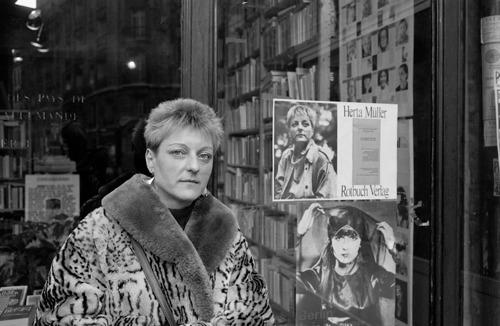
The Swedish Academy’s selection of Romanian-German writer Herta Müller for this year’s Nobel Prize in Literature occasioned surprise in the United States, where Müller is little known. But in Romania, reactions have been strong—and ambivalent.
Born into the country’s German minority, Müller first gained notoriety in the 1980s for her dark vision of life under the Communist regime; she was forced to flee to Germany, where she has lived ever since. In its announcement, the Swedish Academy praised Müller for her poetical “frankness” in depicting what it called “the landscape of the dispossessed.”
Hugh Eakin, an editor at the New York Review of Books, spoke with Norman Manea, one of Romania’s most prominent writers and himself an exile from the Communist regime, about Herta Müller and her complicated relationship to her native country. Following are excerpts from the interview, which is also available as a podcast at nybooks.com/podcasts.
Hugh Eakin: A lot of Herta Müller’s books seem to deal with the late phase of the Ceauşescu dictatorship.
Norman Manea: I would say her entire work. It is her obsession – almost her unique obsession.
HE: I take it the first book that she published, the story collection Nadirs (1982), got her into trouble.
NM: It was a description, very realistic, sharp and brutal, about life in the rural areas of Rumania, which were totally decayed, isolated, and uncivilized. And of course, unbearable to the system, she published the book in West Germany— it was a big shock, and a huge benefit to the anti-Communists there. So the book was considered an insult to the Romanian state and to the Communist Party.
They started a very persistent campaign in Romania, and outside Romania among the Romanian-German émigrés in West Germany, to compromise her, to spread rumors that she was a West German spy. The secret police were everywhere – of course they infiltrated all the minority communities, as they infiltrated all the institutions.
HE: When you were growing up in Romania, what was the status of the Germany minority?
NM: It was a combination of indifference and respect – for the efficiency of the Germany community, for their so-called honesty and hard work. A Romanian literary critic of the same generation as Herta Müller wrote that he hoped that her Nobel would start a debate about the persecution of minorities and about their status. And he also added that this is easier because she is a Romanian German; it would have been much more difficult if she had been a Romanian Hungarian or a Romanian Jew.
There is still an ethnocentric vision [in Romania] with a very passionate sense of belonging to the nation, and of being suspicious of foreigners, even if the foreigners [in question] have lived there for hundreds of years.
HE: One of Herta Müller’s big themes is the continuity of the security state in Romania.
NM: She was extremely fierce in her criticism after 1989. This transition in Romania of civil society was and still is extremely ambiguous. Four million Communists became, the day after the dictator was killed, fierce anti-Communists. All of them claimed that they were victims – some of them really were. But a lot of people who worked in the former secret police became the nouveaux riches and now had another kind of power. And some of them are still in the shadows. And she spoke openly and insistently about this, which was not very easy to swallow, even for the post-Communist generation.
HE: She recently wrote an essay in which she describes trying to get her secret police file. We have heard so much about the process in Germany of going through Stasi files. But in Romania, it’s far more complicated.
NM: In Romania, it was totally chaotic. A lot of files disappeared, a lot of files were changed, and a lot of files were sold – to the newspapers and others. And it’s still going on – less now, because there is now an institution under state control that deals with these files. But that was established only two or three years ago, twenty years after the fall of the dictatorship: a lot of time for a byzantine country where everything is under the table. So these files were manipulated for political reasons— for current political reasons, for example to compromise an adversary.
I asked at one point for my secret police files, and after a long time I received some 200 pages, but also a letter in which I was told that this was not the entire file. And that they cannot give me more, because they need approval from the Minister of Internal Affairs. So this means in practice that you cannot see your files – only selected files.
Advertisement
HE: What did you find in the files that you did receive?
NM: The main period, when I was followed and had a lot of trouble there, was missing. Tough things that I expected to see, I didn’t. But there were some interesting things. For instance, when I came back from the Nazi camps in 1945 with my family, I was nine years old. And we went through a medical evaluation by the Red Cross. We never were given any medical certificate, or proof of what they saw. But I found in these files, the record of my medical evaluation at nine years old. I was not yet a dissident or a Communist or anything else. And I never knew it existed.
HE: So there was an attempt to collect every bit of information about you?
NM: Every bit. Everything they could use to blackmail you or intimidate you or find a kind of clue for their own psychological portrait of the person who they were following: I don’t know, I’m not in this profession. But the fact that this medical record was there was amusing, but also frightening.


